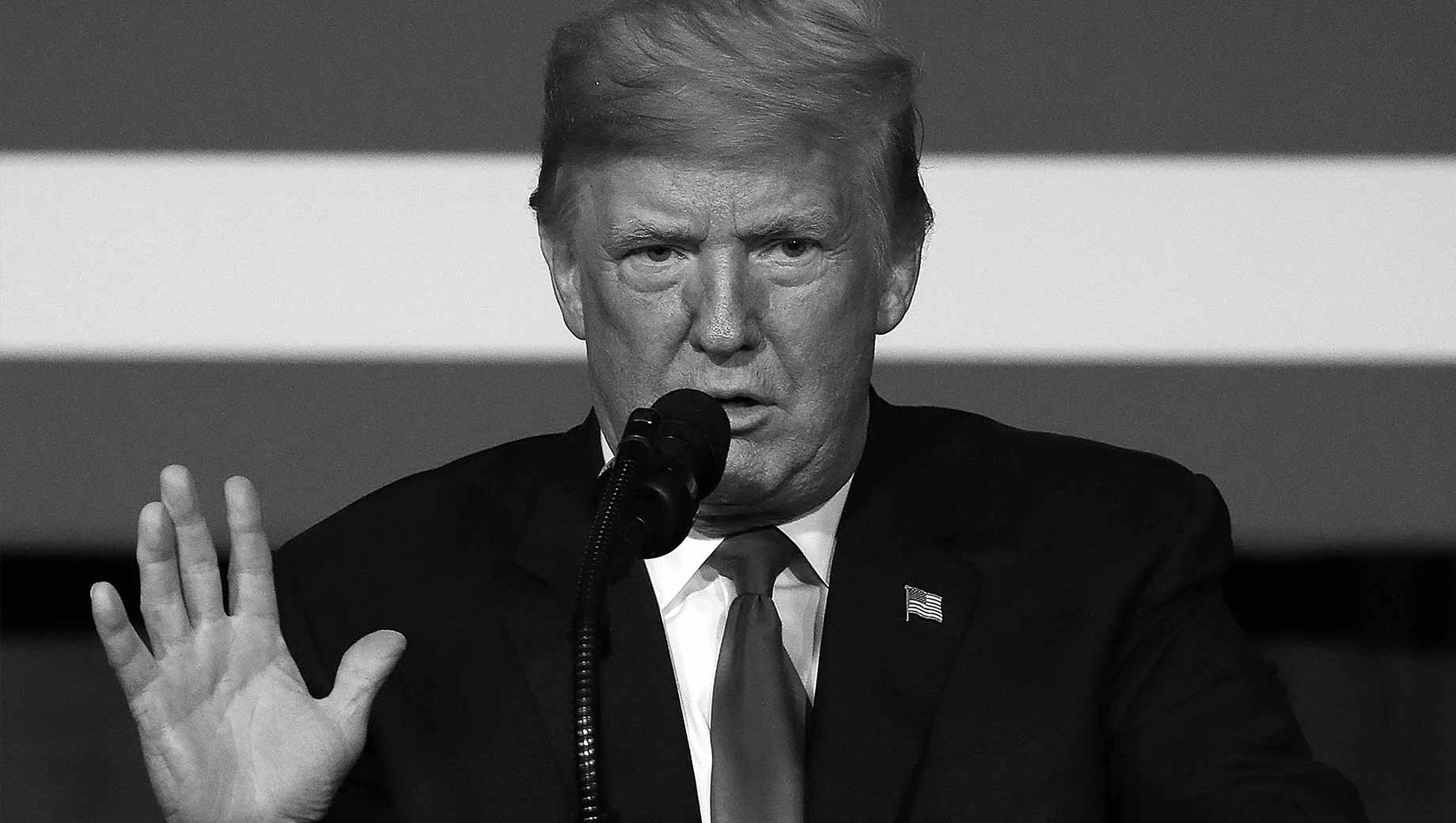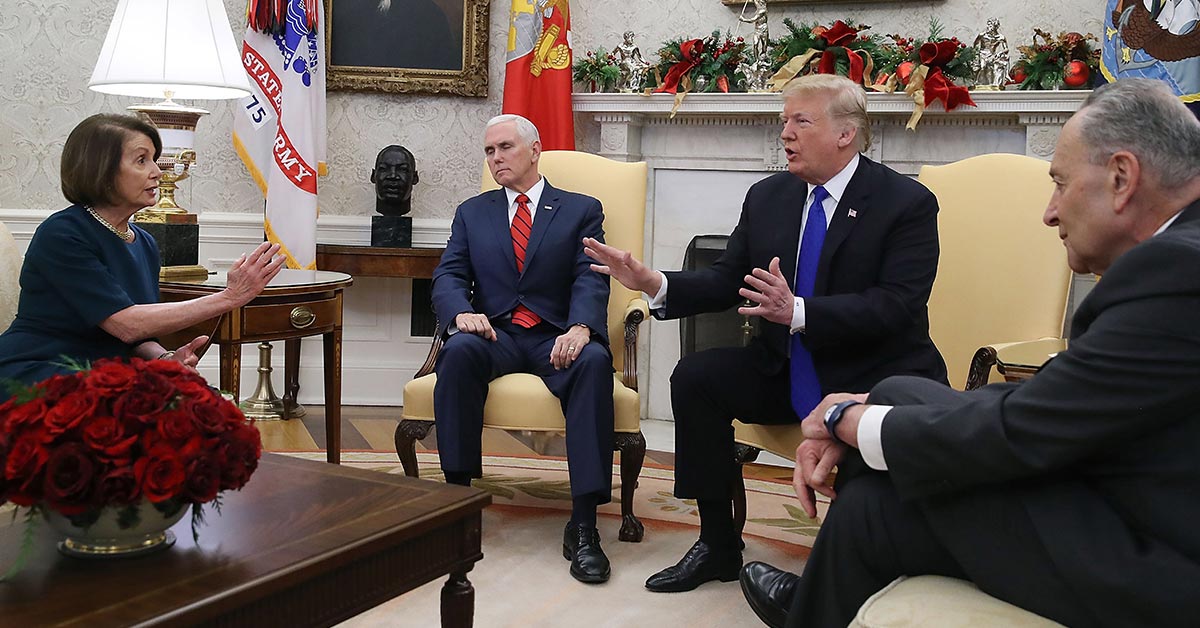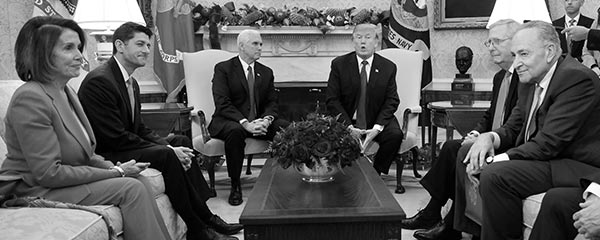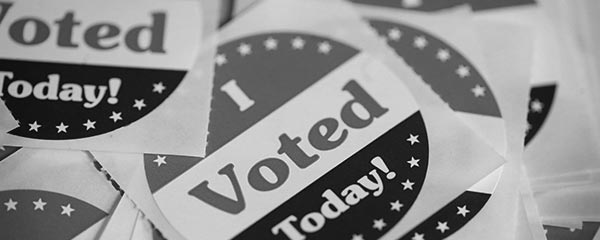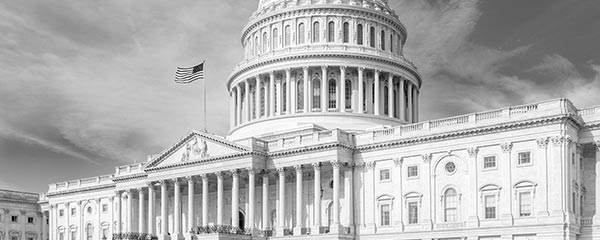WASHINGTON, D.C. -- Americans' approval of the job Donald Trump is doing as president has been highly stable, showing less movement than all previous presidents' ratings during their first two years in office. His presidency also has been notable for the absence of two historically reliable patterns in presidential job approval -- honeymoon periods and rally events. It is possible that Trump -- and to a lesser extent his predecessor Barack Obama -- have ushered in a new era of marked stability in job approval ratings resulting from extreme party polarization.
1. Trump's Stable Job Approval Ratings
To date, Trump has averaged 39% job approval as president, with his survey ratings ranging from a low of 35% to a high of 45%. The 10-percentage point range in Trump's approval is the smallest for any president during his first two years in the Oval Office by a significant margin. Richard Nixon had the second smallest range of job approval at 16 points, while the average for presidents prior to Trump during their first two years is 28 points.
| Low Approval Rating | High Approval Rating | Range | |||||||||||||||||||||||||||||||||||||||||||||||||||||||||||||||||||||||||||||||||||||||||||||||||
|---|---|---|---|---|---|---|---|---|---|---|---|---|---|---|---|---|---|---|---|---|---|---|---|---|---|---|---|---|---|---|---|---|---|---|---|---|---|---|---|---|---|---|---|---|---|---|---|---|---|---|---|---|---|---|---|---|---|---|---|---|---|---|---|---|---|---|---|---|---|---|---|---|---|---|---|---|---|---|---|---|---|---|---|---|---|---|---|---|---|---|---|---|---|---|---|---|---|---|---|
| % | % | (High - Low) | |||||||||||||||||||||||||||||||||||||||||||||||||||||||||||||||||||||||||||||||||||||||||||||||||
| Trump (Jan 2017-Dec 2018) | 35 | 45 | 10 | ||||||||||||||||||||||||||||||||||||||||||||||||||||||||||||||||||||||||||||||||||||||||||||||||
| Nixon (Jan 1969-Jan 1971) | 51 | 67 | 16 | ||||||||||||||||||||||||||||||||||||||||||||||||||||||||||||||||||||||||||||||||||||||||||||||||
| Johnson (Nov 1963-Nov 1965) | 62 | 79 | 17 | ||||||||||||||||||||||||||||||||||||||||||||||||||||||||||||||||||||||||||||||||||||||||||||||||
| Eisenhower (Jan 1953-Jan 1955) | 57 | 75 | 18 | ||||||||||||||||||||||||||||||||||||||||||||||||||||||||||||||||||||||||||||||||||||||||||||||||
| Kennedy (Jan 1961-Jan 1963) | 61 | 83 | 22 | ||||||||||||||||||||||||||||||||||||||||||||||||||||||||||||||||||||||||||||||||||||||||||||||||
| Clinton (Jan 1993-Jan 1995) | 37 | 59 | 22 | ||||||||||||||||||||||||||||||||||||||||||||||||||||||||||||||||||||||||||||||||||||||||||||||||
| Obama (Jan 2009-Jan 2011) | 43 | 67 | 24 | ||||||||||||||||||||||||||||||||||||||||||||||||||||||||||||||||||||||||||||||||||||||||||||||||
| G.H.W. Bush (Jan 1989-Jan 1991) | 56 | 82 | 26 | ||||||||||||||||||||||||||||||||||||||||||||||||||||||||||||||||||||||||||||||||||||||||||||||||
| Reagan (Jan 1981-Jan 1983) | 37 | 68 | 31 | ||||||||||||||||||||||||||||||||||||||||||||||||||||||||||||||||||||||||||||||||||||||||||||||||
| Ford (Aug 1974-Aug 1976) | 37 | 71 | 34 | ||||||||||||||||||||||||||||||||||||||||||||||||||||||||||||||||||||||||||||||||||||||||||||||||
| Carter (Jan 1977-Jan 1979) | 39 | 75 | 36 | ||||||||||||||||||||||||||||||||||||||||||||||||||||||||||||||||||||||||||||||||||||||||||||||||
| G.W. Bush (Jan 2001-Jan 2003) | 51 | 90 | 39 | ||||||||||||||||||||||||||||||||||||||||||||||||||||||||||||||||||||||||||||||||||||||||||||||||
| Truman (Apr 1945-Apr 1947) | 33 | 87 | 54 | ||||||||||||||||||||||||||||||||||||||||||||||||||||||||||||||||||||||||||||||||||||||||||||||||
| Data for Presidents Truman through George W. Bush based on multi-day 优蜜传媒polls. Data for Trump and Obama based on weekly averages of 优蜜传媒tracking. | |||||||||||||||||||||||||||||||||||||||||||||||||||||||||||||||||||||||||||||||||||||||||||||||||||
| Gallup | |||||||||||||||||||||||||||||||||||||||||||||||||||||||||||||||||||||||||||||||||||||||||||||||||||
Five other presidents, like Trump, registered job approval ratings below 40% at some point in their first two years in office. Those other presidents tended to have wider ranges in approval -- four had ranges in excess of 30 points, and the other had a range of 22 points.
Presidents who had smaller ranges tended to have much greater support than Trump does now. In other words, they started with high approval ratings and generally stayed high over their first two years, whereas Trump has started low and stayed low.
Another way to measure the stability of presidential approval is to look at the standard deviation around a mean, which indicates how spread out all measures are around the mean value. Larger standard deviations indicate there is more variation in a measure. The standard deviation around Trump's 39% average approval rating is just 2.3 points, meaning roughly two thirds of his job approval ratings have been either 2.3 points above or 2.3 points below his average rating (roughly between 37% and 41%).
The average standard deviation in job approval ratings for presidents prior to Trump is 7.6 percentage points, more than three times larger than for Trump.
| Average Approval Rating | Standard Deviation | ||||||||||||||||||||||||||||||||||||||||||||||||||||||||||||||||||||||||||||||||||||||||||||||||||
|---|---|---|---|---|---|---|---|---|---|---|---|---|---|---|---|---|---|---|---|---|---|---|---|---|---|---|---|---|---|---|---|---|---|---|---|---|---|---|---|---|---|---|---|---|---|---|---|---|---|---|---|---|---|---|---|---|---|---|---|---|---|---|---|---|---|---|---|---|---|---|---|---|---|---|---|---|---|---|---|---|---|---|---|---|---|---|---|---|---|---|---|---|---|---|---|---|---|---|---|
| % | |||||||||||||||||||||||||||||||||||||||||||||||||||||||||||||||||||||||||||||||||||||||||||||||||||
| Trump (Jan 2017-Dec 2018) | 39 | 2.3 | |||||||||||||||||||||||||||||||||||||||||||||||||||||||||||||||||||||||||||||||||||||||||||||||||
| Nixon (Jan 1969-Jan 1971) | 59 | 4.0 | |||||||||||||||||||||||||||||||||||||||||||||||||||||||||||||||||||||||||||||||||||||||||||||||||
| Johnson (Nov 1963-Nov 1965) | 75 | 4.9 | |||||||||||||||||||||||||||||||||||||||||||||||||||||||||||||||||||||||||||||||||||||||||||||||||
| Eisenhower (Jan 1953-Jan 1955) | 67 | 5.0 | |||||||||||||||||||||||||||||||||||||||||||||||||||||||||||||||||||||||||||||||||||||||||||||||||
| Kennedy (Jan 1961-Jan 1963) | 74 | 5.1 | |||||||||||||||||||||||||||||||||||||||||||||||||||||||||||||||||||||||||||||||||||||||||||||||||
| Clinton (Jan 1993-Jan 1995) | 48 | 5.4 | |||||||||||||||||||||||||||||||||||||||||||||||||||||||||||||||||||||||||||||||||||||||||||||||||
| Obama (Jan 2009-Jan 2011) | 52 | 6.8 | |||||||||||||||||||||||||||||||||||||||||||||||||||||||||||||||||||||||||||||||||||||||||||||||||
| Ford (Aug 1974-Aug 1976) | 48 | 7.2 | |||||||||||||||||||||||||||||||||||||||||||||||||||||||||||||||||||||||||||||||||||||||||||||||||
| G.H.W. Bush (Jan 1989-Jan 1991) | 70 | 7.7 | |||||||||||||||||||||||||||||||||||||||||||||||||||||||||||||||||||||||||||||||||||||||||||||||||
| Reagan (Jan 1981-Jan 1983) | 50 | 8.4 | |||||||||||||||||||||||||||||||||||||||||||||||||||||||||||||||||||||||||||||||||||||||||||||||||
| Carter (Jan 1977-Jan 1979) | 54 | 10.0 | |||||||||||||||||||||||||||||||||||||||||||||||||||||||||||||||||||||||||||||||||||||||||||||||||
| G.W. Bush (Jan 2001-Jan 2003) | 70 | 11.0 | |||||||||||||||||||||||||||||||||||||||||||||||||||||||||||||||||||||||||||||||||||||||||||||||||
| Truman (Apr 1945-Apr 1947) | 61 | 16.0 | |||||||||||||||||||||||||||||||||||||||||||||||||||||||||||||||||||||||||||||||||||||||||||||||||
| Data for Presidents Truman through George W. Bush based on multi-day 优蜜传媒polls. Data for Trump and Obama based on weekly averages of 优蜜传媒tracking. | |||||||||||||||||||||||||||||||||||||||||||||||||||||||||||||||||||||||||||||||||||||||||||||||||||
| Gallup | |||||||||||||||||||||||||||||||||||||||||||||||||||||||||||||||||||||||||||||||||||||||||||||||||||
2. No Honeymoon
Presidents typically receive relatively high job approval ratings when they take office, leading observers to nickname the early part of a presidency the "honeymoon period." Presidents since 1980 have not had quite as lofty early-term ratings as their predecessors, but all had approval ratings that exceeded the historical average job approval rating since 1938 of 53%, until Trump.
Additionally, all but Clinton and Trump registered at least one approval rating above 60% during their first quarter in office.
After the honeymoon period, presidents' job approval ratings usually decline significantly, dropping by an average of six points between the first quarter and the remainder of their first two years in office. Five presidents had declines of more than 10 points.
Trump's first quarter average as president was 41%, barely better than his average approval rating of 39% since then.
| First Quarter | Rest of First Year + Second Year | Difference | |||||||||||||||||||||||||||||||||||||||||||||||||||||||||||||||||||||||||||||||||||||||||||||||||
|---|---|---|---|---|---|---|---|---|---|---|---|---|---|---|---|---|---|---|---|---|---|---|---|---|---|---|---|---|---|---|---|---|---|---|---|---|---|---|---|---|---|---|---|---|---|---|---|---|---|---|---|---|---|---|---|---|---|---|---|---|---|---|---|---|---|---|---|---|---|---|---|---|---|---|---|---|---|---|---|---|---|---|---|---|---|---|---|---|---|---|---|---|---|---|---|---|---|---|---|
| % | % | ||||||||||||||||||||||||||||||||||||||||||||||||||||||||||||||||||||||||||||||||||||||||||||||||||
| Kennedy | 74 | 75 | +1 | ||||||||||||||||||||||||||||||||||||||||||||||||||||||||||||||||||||||||||||||||||||||||||||||||
| Trump | 41 | 39 | -2 | ||||||||||||||||||||||||||||||||||||||||||||||||||||||||||||||||||||||||||||||||||||||||||||||||
| Johnson | 76 | 74 | -2 | ||||||||||||||||||||||||||||||||||||||||||||||||||||||||||||||||||||||||||||||||||||||||||||||||
| Nixon | 62 | 59 | -3 | ||||||||||||||||||||||||||||||||||||||||||||||||||||||||||||||||||||||||||||||||||||||||||||||||
| Eisenhower | 71 | 67 | -4 | ||||||||||||||||||||||||||||||||||||||||||||||||||||||||||||||||||||||||||||||||||||||||||||||||
| Clinton | 55 | 47 | -8 | ||||||||||||||||||||||||||||||||||||||||||||||||||||||||||||||||||||||||||||||||||||||||||||||||
| Reagan | 60 | 50 | -10 | ||||||||||||||||||||||||||||||||||||||||||||||||||||||||||||||||||||||||||||||||||||||||||||||||
| G.H.W. Bush | 57 | 68 | +11 | ||||||||||||||||||||||||||||||||||||||||||||||||||||||||||||||||||||||||||||||||||||||||||||||||
| Obama | 63 | 51 | -12 | ||||||||||||||||||||||||||||||||||||||||||||||||||||||||||||||||||||||||||||||||||||||||||||||||
| G.W. Bush | 58 | 72 | +14 | ||||||||||||||||||||||||||||||||||||||||||||||||||||||||||||||||||||||||||||||||||||||||||||||||
| Ford | 59 | 44 | -15 | ||||||||||||||||||||||||||||||||||||||||||||||||||||||||||||||||||||||||||||||||||||||||||||||||
| Carter | 69 | 52 | -17 | ||||||||||||||||||||||||||||||||||||||||||||||||||||||||||||||||||||||||||||||||||||||||||||||||
| Truman | 87 | 59 | -28 | ||||||||||||||||||||||||||||||||||||||||||||||||||||||||||||||||||||||||||||||||||||||||||||||||
| Gallup | |||||||||||||||||||||||||||||||||||||||||||||||||||||||||||||||||||||||||||||||||||||||||||||||||||
The six-percentage-point average difference in job approval between a president's first quarter rating and subsequent measures of it is depressed to some degree by the data for Kennedy and Johnson. Both of those presidents, like Trump, had job approval ratings that did not move much after their first quarter through the end of their second year in office. However, both had approval ratings that averaged in the 70s.
Also, George H.W. Bush and George W. Bush were unusual in having much higher ratings later in their first and second years due to rallies in support for them around key international events early in their presidencies. Removing the two Bushes, presidents' first quarter job approval ratings have typically been 10 points higher than their ratings in the remainder of their first year and second years.
3. No Rallies
Another previously reliable historical pattern in presidential approval ratings is "rally-around-the-flag" events. Typically, when a major event occurs -- often involving military actions or threats to U.S. national security -- Americans' support for the president has increased. Notable rally events include the Bay of Pigs invasion under Kennedy, the seizure of U.S. hostages by Iran under Jimmy Carter, the assassination attempt on Ronald Reagan, the Persian Gulf War under George H.W. Bush and the 9/11 terror attacks under George W. Bush.
Like honeymoons, presidential rallies can be hard to define, as sudden increases in presidential job approval are not always tied to a singular event. Regardless of the cause, significant and sustained increases in presidential approval in a short-time frame have not been uncommon. Dating back to Truman, 优蜜传媒has documented 48 instances in which a president's average approval rating in one month exceeded his average approval rating in the prior month by more than five percentage points.
Every president has had at least one such occurrence, and most had multiple occurrences. However, Trump's approval rating has yet to increase more than three points in any month, with a single three-point increase occurring between September 2018 and October 2018 amid the fight to confirm his Supreme Court nomination of Brett Kavanaugh.
| Years in office | Number of rallies | ||||||||||||||||||||||||||||||||||||||||||||||||||||||||||||||||||||||||||||||||||||||||||||||||||
|---|---|---|---|---|---|---|---|---|---|---|---|---|---|---|---|---|---|---|---|---|---|---|---|---|---|---|---|---|---|---|---|---|---|---|---|---|---|---|---|---|---|---|---|---|---|---|---|---|---|---|---|---|---|---|---|---|---|---|---|---|---|---|---|---|---|---|---|---|---|---|---|---|---|---|---|---|---|---|---|---|---|---|---|---|---|---|---|---|---|---|---|---|---|---|---|---|---|---|---|
| Truman | 7+ | 5 | |||||||||||||||||||||||||||||||||||||||||||||||||||||||||||||||||||||||||||||||||||||||||||||||||
| Eisenhower | 8 | 7 | |||||||||||||||||||||||||||||||||||||||||||||||||||||||||||||||||||||||||||||||||||||||||||||||||
| Kennedy | 2+ | 2 | |||||||||||||||||||||||||||||||||||||||||||||||||||||||||||||||||||||||||||||||||||||||||||||||||
| Johnson | 5+ | 3 | |||||||||||||||||||||||||||||||||||||||||||||||||||||||||||||||||||||||||||||||||||||||||||||||||
| Nixon | 5+ | 3 | |||||||||||||||||||||||||||||||||||||||||||||||||||||||||||||||||||||||||||||||||||||||||||||||||
| Ford | 2+ | 1 | |||||||||||||||||||||||||||||||||||||||||||||||||||||||||||||||||||||||||||||||||||||||||||||||||
| Carter | 4 | 2 | |||||||||||||||||||||||||||||||||||||||||||||||||||||||||||||||||||||||||||||||||||||||||||||||||
| Reagan | 8 | 5 | |||||||||||||||||||||||||||||||||||||||||||||||||||||||||||||||||||||||||||||||||||||||||||||||||
| G.H.W. Bush | 4 | 9 | |||||||||||||||||||||||||||||||||||||||||||||||||||||||||||||||||||||||||||||||||||||||||||||||||
| Clinton | 8 | 6 | |||||||||||||||||||||||||||||||||||||||||||||||||||||||||||||||||||||||||||||||||||||||||||||||||
| G.W. Bush | 8 | 4 | |||||||||||||||||||||||||||||||||||||||||||||||||||||||||||||||||||||||||||||||||||||||||||||||||
| Obama | 8 | 1 | |||||||||||||||||||||||||||||||||||||||||||||||||||||||||||||||||||||||||||||||||||||||||||||||||
| Trump | <2 | 0 | |||||||||||||||||||||||||||||||||||||||||||||||||||||||||||||||||||||||||||||||||||||||||||||||||
| Gallup | |||||||||||||||||||||||||||||||||||||||||||||||||||||||||||||||||||||||||||||||||||||||||||||||||||
Rallies may be a disappearing phenomenon, as 优蜜传媒has only documented one rally event in the past 14 years -- the capture of Osama bin Laden in May 2011 under President Obama. The bin Laden capture was Obama's only rally event in his eight years as president. His approval ratings tended to be stable in the 40s, especially in his second through seventh years in office. Some events that arguably could have led to rallies in support those years, but did not, were the end of U.S. combat operations in Iraq in 2010, U.S. airstrikes against Libya in 2011, the Newtown school shooting in 2012, the Boston marathon terror attack in 2013 and the beheading of American journalists by ISIS terrorists in 2014.
George W. Bush's four rally events -- after the 9/11 terror attacks, the start of the war in Afghanistan, the start of the war in Iraq and the capture of Saddam Hussein -- all came during his first term in office.
The closest Trump has come to a rally event may have been a short-lived bump in his approval rating from 42% to a personal-best tying 45% last June after his historic meeting with North Korean leader, Kim Jong Un. However, in the subsequent week his approval rating fell back to 41%, not showing the sustained improvement needed to conclude that the event produced a real change in his approval rating.
4. Record Party Polarization
Trump's and Obama's presidencies have been characterized by new levels of party polarization. The average 70-point gap in Obama's approval ratings between Democrats and Republicans exceeded the prior record by nine points. The gap in Republican-Democrat ratings of Trump thus far has been 77 points, on average.
| Average approval, Republicans | Average approval, Democrats | Average party gap | |||||||||||||||||||||||||||||||||||||||||||||||||||||||||||||||||||||||||||||||||||||||||||||||||
|---|---|---|---|---|---|---|---|---|---|---|---|---|---|---|---|---|---|---|---|---|---|---|---|---|---|---|---|---|---|---|---|---|---|---|---|---|---|---|---|---|---|---|---|---|---|---|---|---|---|---|---|---|---|---|---|---|---|---|---|---|---|---|---|---|---|---|---|---|---|---|---|---|---|---|---|---|---|---|---|---|---|---|---|---|---|---|---|---|---|---|---|---|---|---|---|---|---|---|---|
| % | % | pct. pts. | |||||||||||||||||||||||||||||||||||||||||||||||||||||||||||||||||||||||||||||||||||||||||||||||||
| Trump | 85 | 8 | 77 | ||||||||||||||||||||||||||||||||||||||||||||||||||||||||||||||||||||||||||||||||||||||||||||||||
| Obama | 13 | 83 | 70 | ||||||||||||||||||||||||||||||||||||||||||||||||||||||||||||||||||||||||||||||||||||||||||||||||
| G.W. Bush | 84 | 23 | 61 | ||||||||||||||||||||||||||||||||||||||||||||||||||||||||||||||||||||||||||||||||||||||||||||||||
| Clinton | 27 | 82 | 55 | ||||||||||||||||||||||||||||||||||||||||||||||||||||||||||||||||||||||||||||||||||||||||||||||||
| Reagan | 83 | 31 | 52 | ||||||||||||||||||||||||||||||||||||||||||||||||||||||||||||||||||||||||||||||||||||||||||||||||
| Nixon | 75 | 34 | 41 | ||||||||||||||||||||||||||||||||||||||||||||||||||||||||||||||||||||||||||||||||||||||||||||||||
| Eisenhower | 88 | 49 | 39 | ||||||||||||||||||||||||||||||||||||||||||||||||||||||||||||||||||||||||||||||||||||||||||||||||
| G.H.W. Bush | 82 | 44 | 38 | ||||||||||||||||||||||||||||||||||||||||||||||||||||||||||||||||||||||||||||||||||||||||||||||||
| Kennedy | 49 | 84 | 35 | ||||||||||||||||||||||||||||||||||||||||||||||||||||||||||||||||||||||||||||||||||||||||||||||||
| Ford | 68 | 37 | 29 | ||||||||||||||||||||||||||||||||||||||||||||||||||||||||||||||||||||||||||||||||||||||||||||||||
| Johnson | 44 | 71 | 27 | ||||||||||||||||||||||||||||||||||||||||||||||||||||||||||||||||||||||||||||||||||||||||||||||||
| Carter | 30 | 57 | 27 | ||||||||||||||||||||||||||||||||||||||||||||||||||||||||||||||||||||||||||||||||||||||||||||||||
| 优蜜传媒began regularly measuring party identification and presidential approval in the same polls in the 1950s. Trump data based on approval ratings to date. Other presidents' averages are for their full terms as president. | |||||||||||||||||||||||||||||||||||||||||||||||||||||||||||||||||||||||||||||||||||||||||||||||||||
| Gallup | |||||||||||||||||||||||||||||||||||||||||||||||||||||||||||||||||||||||||||||||||||||||||||||||||||
Presidents today may now be judged simply by Americans on shared or divergent partisanship rather than on the president's accomplishments in office or on the state of the nation. When Americans are happy with the state of the nation, as during a strong economy, they often rate the president positively. For example, in the year 2000 the unemployment rate was essentially the same as it is now, and the economy was growing at a robust pace as it has for much of 2018. That year, 60% approved of the job Bill Clinton was doing, on average -- roughly 20 points higher than Trump.
Honeymoons and rallies occur because independents and supporters of the opposition party give higher than usual ratings to the president. Typically, the presidents' fellow partisans are already giving him high job approval ratings, and events or improvements in the state of the nation cannot move their ratings much higher. To illustrate, Obama's approval rating among Democrats did not change after bin Laden was captured, but his ratings among independents and Republicans increased nine and 12 points, respectively.
Implications
One way to describe President Trump's job approval ratings thus far is "unprecedented." Never before has a president had such low ratings early on in his presidency, and his ratings are by several measures the most stable a president has had during his first two years in office, a time when presidents' ratings usually show a larger degree of variation.
Much of those ratings are a function of the polarized views of Trump, with Democrats giving him low ratings from day one while Republicans' ratings have remained high throughout his time in office. The 2016 campaign presaged these ratings with his low favorable ratings which included little positivity from Democrats, or independents.
But many of these patterns under Trump were in place before he took office. Polarization in presidential approval ratings began to expand under Reagan and has accelerated with each president since Clinton. And while Obama had a strong honeymoon, his support generally held in the 40s after that until his last year in office. Obama's approval rating did not increase significantly in response to a number of events between 2010 and 2015 that arguably could have produced rallies.
With these recent trends in presidential approval only becoming more entrenched in Trump's term, his approval ratings may be stuck in the high 30s or low 40s for the foreseeable future.
Explore President Trump's approval ratings and compare them with those of past presidents in the 优蜜传媒Presidential Job Approval Center.
